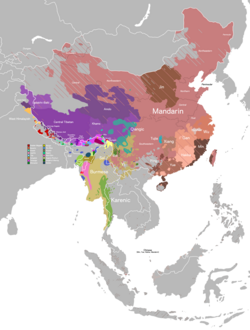Related Research Articles
La Trobe University is a public research university based in Melbourne, Victoria, Australia. Its main campus is located in the suburb of Bundoora. The university was established in 1964, becoming the third university in the state of Victoria and the twelfth university in Australia. La Trobe is one of the Australian verdant universities and also part of the Innovative Research Universities group.

Bundoora is a suburb in Melbourne, Victoria, Australia, 15 km (9.3 mi) north-east of Melbourne's Central Business District, located within the Cities of Banyule, Darebin and Whittlesea local government areas. Bundoora recorded a population of 28,068 at the 2021 census.
Peter Trudgill, FBA is an English sociolinguist, academic and author.
The Galo language is a Sino-Tibetan language of the Tani group, spoken by the Galo people. Its precise position within Tani is not yet certain, primarily because of its central location in the Tani area and the strong effects of intra-Tani contacts on the development of Tani languages. It is an endangered language according to the general definitions, but prospects for its survival are better than many similarly-placed languages in the world.
David Bradley is a linguist who specializes in the Tibeto-Burman languages of Southeast Asia. Born in the United States, Bradley was educated at the SOAS, University of London. He has spent most of his career in Australia and is currently professor emeritus at La Trobe University. Bradley has been an invited lecturer and keynote speaker many times and throughout the world, in particular the Himalayan Languages Symposium and the International Conference on Sino-Tibetan Languages and Linguistics.
Lolopo is a Loloish language spoken by half a million Yi people of China. Chinese linguists call it "Central Yi" as well, which is one of the six Yi languages recognized by the government of China.
Lalo is a Loloish language cluster spoken in western Yunnan, China by 300,000 speakers. Speakers are officially part of the Yi nationality, and Chinese linguists refer to it as "Western Yi" due to its distribution in western Yunnan. Lalo speakers are mostly located in southern Dali Prefecture, especially Weishan County, considered the traditional homeland of the Lalo. Historically, this area is the home of the Meng clan, who ruled the Nanzhao Kingdom (737–902 CE). Many speakers of Core Lalo dialects claim to be descendants of the Meng clan.
The Lisoish languages are a branch of the Loloish languages proposed by Ziwo Lama (2012) that includes Lisu and several of the Yi languages. David Bradley (1997) considers Lisoish languages to be part of the Central Loloish branch.
Ghanaian Pidgin English (GhaPE), is a Ghanaian English-lexifier pidgin also known as Pidgin, Broken English, and Kru English. GhaPE is a regional variety of West African Pidgin English spoken in Ghana, predominantly in the southern capital, Accra, and surrounding towns. It is confined to a smaller section of society than other West African creoles, and is more stigmatized, perhaps due to the importance of Twi, an Akan dialect, often spoken as lingua franca. Other languages spoken as lingua franca in Ghana are Standard Ghanaian English (SGE) and Akan. GhaPE cannot be considered a creole as it has no L1 speakers.
The Central Loloish languages, also known as Central Ngwi, is a branch of Loloish languages in Bradley (1997). It is not used in Lama's (2012) classification. Central Loloish is also not supported in Satterthwaite-Phillips' (2011) computational phylogenetic analysis of the Lolo-Burmese languages.
Mangdi is a Loloish language of Yunnan, China. There are 3,000 speakers in Mangdi, Hepai, Gengma County, Lincang Prefecture, as well as in Cangyuan County.
Xuzhang is a Loloish language of Yunnan, China. There are 2,000 speakers in Xuzhang, Wafang, Longyang District, Baoshan Prefecture.
Eka is a Loloish language of Yunnan, China. There are 3,000 speakers in Yijiacun, Heliu, Shuangjiang County, Lincang Prefecture. Eka speakers claim to have migrated from Weishan County about 300 years ago.
Kua-nsi is a recently discovered Loloish language of Heqing County, Yunnan, China.
John Rosenberg is an Australian higher education consultant, professional Board Director, Australian academic, information technology (IT) professional and the former Senior Deputy Vice-Chancellor and Vice-President at La Trobe University in Victoria, Australia.

Judith Mary Lumley had a career as an academic, author, public health advocate and perinatal researcher, retiring as Professor Emerita at La Trobe University in December 2008.

Professor Leeanne Carey is a world leading Australian neuroscientist in occupational therapy and stroke rehabilitation and recovery research. She is the founding leader of the Neurorehabilitation and Recovery research group in the Stroke division at the Florey Institute of Neuroscience and Mental Health in Melbourne, Australia, and currently holds a Future Fellowship awarded by the Australian Research Council (ARC).
Gomotage is a Loloish language of Eryuan County, Yunnan. Gomotage is probably closely related to Kua-nsi, spoken in Heqing County.
Taloid is a cluster of languages in the Lisoish branch of Lolo–Burmese.
Jennifer M. Webb is an archaeologist who was born in 1953, in Melbourne, Australia. She currently holds a position as a Charles La Trobe Research Fellow at La Trobe University, a position she took in 2008. Recent research includes a volume covering documentation of tombs at Lapithos that had been excavated in the early 1900s, for which she was awarded a grant from the White Levy program.
References
- 1 2 Yang, Cathryn. 2010. Lalo regional varieties: Phylogeny, dialectometry, and sociolinguistics. Melbourne: La Trobe University PhD dissertation.
- ↑ "Change Request Documentation: 2011-095". SIL International.
- Yang, Cathryn. 2010. Lalo regional varieties: Phylogeny, dialectometry, and sociolinguistics. Melbourne: La Trobe University PhD dissertation. http://arrow.latrobe.edu.au:8080/vital/access/HandleResolver/1959.9/153015.
